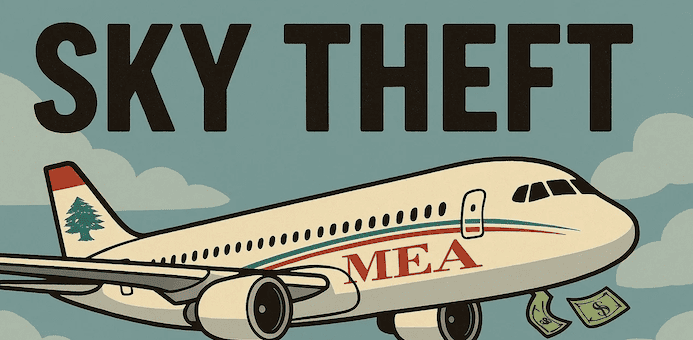Welcome aboard MEA—where the tickets cost a fortune, the service feels like a throwback to the Cold War, and the only thing flying higher than the planes are the prices. Lebanon’s national carrier has turned its monopoly into a money-printing machine, throttling tourism, draining diaspora wallets, and running on a mix of nostalgia and nepotism. The pilots are world-class, the management is pure class privilege, and the rest of us? We’re stuck paying triple just to land in our own country.
It starts with a ticket. Not a golden one to Willy Wonka’s factory—just a standard round-trip to Beirut. Only it’ll set you back the price of a decent second-hand car. Paris to Beirut? €1,300. London? Don’t ask unless you’ve just sold a kidney. And while travelers to Amman or Istanbul sip cocktails at half the price, Lebanon’s diaspora is trying to crowdsource airfare like it’s a GoFundMe for a medical emergency.
Meanwhile, MEA continues to cash in like it’s running the last flight out of a burning city—because in many ways, it is. The excuse? “Our flights are full.” The reality? People still want to come home. But just because folks are willing to pay doesn’t mean they should be fleeced on arrival. When your economy depends on tourism, the airport should feel like a welcome mat—not a velvet-rope club with extortionate entry fees.
Now you’d think, with all that money pouring in, we’d be getting platinum service in return. Think again. The planes are decent enough, but the service feels like a throwback to an era when asking for another coffee was considered high treason. Rumor has it that the business class crew is selected based on seniority—not experience, just how many presidential elections they’ve survived. No offense to the ladies, but business class has become less Emirates elegance and more… sedated nostalgia where greetings often arrive with a side of orthopedic shoes.
That said, credit where credit’s due: MEA’s pilots are legends. These guys land planes in weather that would make seasoned captains cry for their mothers. They’ve flown through wars, missile threats, and airspace that even Google Maps refuses to recognize. If national pride still exists at cruising altitude, it’s sitting in the cockpit. But that’s where the praise ends—because once you descend into management, the story hits turbulence.
Because guess what? Not all pilots are treated equally. There’s a little-known scandal that’s pure Middle Eastern drama: apparently, if you’re a regular pilot and you upgrade a friend or family member to business class, you get slapped with a disciplinary warning and a black mark on your file. But if you happen to be, say, the son of MEA’s president, you can hand out upgrades like baklava at a wedding—no questions asked. Apparently, fairness doesn’t make the flight manifest.
At the top sits MEA’s long-serving executive leadership, and if the stories are true, the entire upper floor could double as a family reunion. Videos are circulating of managerial appointments that seem to rely more on shared chromosomes than on actual credentials. It’s the kind of operation where the boardroom feels like a dinner table—and the only ones not invited are the passengers footing the bill.
And the scandals? Oh, they fly faster than the planes. Lawsuits reportedly name names and detail everything from creative accounting gymnastics to suspicious cash flows routed through MEA’s catering arm—allegedly delivering bundles of cash to a former high-ranking security officer. Meanwhile, passengers have reported food poisoning mid-air. And who could forget that glorious episode in 2022, when a commercial MEA flight from Madrid to Beirut, reportedly captained by someone very close to the top brass, went radio silent over Greece and triggered a military scramble. Greek fighter jets intercepted the Airbus A321 mid-air like a scene out of Top Gun: The Dynastic Edition. The cause? A “radio error,” they say. But it still takes a special kind of altitude privilege to nearly provoke NATO and get away with barely a press release.
Even the ground game is shady. Rumors swirl about a rogue team at check-in who “accidentally” cancel your ticket on arrival—only to reissue it at a higher fare and discreetly pocket the difference. Just when you thought you were flying MEA, it turns out you were flying Legacy Air—where the last name on your passport matters more than the one on your boarding pass.
Some point fingers at the central bank, since it owns 99.37% of MEA. But that’s like blaming a shareholder for the snacks running out at your cousin’s wedding. The bank may own the plane, but it doesn’t pick the in-flight movie—or the crew. MEA is technically a private company with all the reporting rights of a pawnshop, which means the government gets to sit at the boardroom table, smile politely, and do nothing.
So where does that leave us? With a flag carrier waving the wrong flag—a national airline too patriotic to compete and too dynastic to care. MEA has become less of a gateway to Lebanon and more of a velvet-roped racket, run like a flying family reunion with ticket prices that could finance a small coup. Yes, the pilots are heroes—navigating warzones and bad coffee with equal grace—but that doesn’t excuse the airline’s transformation into a hereditary franchise with wings. What Lebanon needs isn’t loyalty programs for the well-connected or in-flight kabobs of cronyism—it needs open skies. Real competition. Low-cost carriers with landing rights and zero uncles on the board. Because in a country begging for tourists, investment, and fresh oxygen, our airspace should be a highway, not a hostage situation.
MEA may be our flag carrier, but right now it’s carrying that flag straight into irrelevance. And if they won’t lower their prices, then maybe it’s time we raise some hell.

